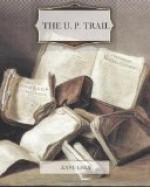The Territory of Arizona had presented a spike of gold, silver, and iron; Nevada had given one of silver, and a railroad tie of laurel wood; and the last spike of all—of solid gold—was presented by California.
The driving of the last spike was to be heard all over the United States. Omaha was the telegraphic center. The operator here had informed all inquirers, “When the last spike is driven at Promontory Point we will say, ‘Done!’”
The magic of the wire was to carry that single message abroad over the face of the land.
The President of the United States was to be congratulated, as were the officers of the army, and the engineers of the work. San Francisco had arranged a monster celebration marked by the booming of cannon and enthusiastic parades. Free railroad tickets into Sacramento were to fill that city with jubilant crowds. At Omaha cannons were to be fired, business abandoned, and the whole city given over to festivity. Chicago was to see a great parade and decoration. In New York a hundred guns were to boom out the tidings. Trinity Church was to have special services, and the famous chimes were to play “Old Hundred.” In Philadelphia a ringing of the Liberty Bell in Independence Hall would initiate a celebration. And so it would be in all prominent cities of the Union.
Neale was at Promontory Point that summer day. He stood aloof from the crowd, on a little bank, watching with shining eyes.
To him the scene was great, beautiful, final.
Only a few hundreds of that vast army of laborers were present at the meeting of the rails, but enough were there to represent the whole. Neale’s glances were swift and gathering. His comrades, Pat and McDermott, sat near, exchanging lights for their pipes. They seemed reposeful, and for them the matter was ended. Broken hulks of toilers of the rails! Neither would labor any more. A burly Negro, with crinkly, bullet-shaped head, leaned against a post; a brawny spiker, naked to the waist, his wonderful shoulders and arms brown, shiny, knotted, scarred, stood near, sledge in hand; a group of Irishmen, red-and blue-shirted, puffed their black pipes and argued; swarthy, sloe-eyed Mexicans, with huge sombreros on their knees, lolled in the shade of a tree, talking low in their mellow tones and fingering cigarettes; Chinamen, with long pig-tails and foreign dress, added strangeness and colorful contrast.
Neale heard the low murmur of voices of the crowd, and the slow puffing of the two engines, head on, only a few yards apart, so strikingly different in shape. Then followed the pounding of hoofs and tread of many feet, the clang of iron as the last rail went down. How clear, sweet, spanging the hammer blows! And there was the old sighing sweep of the wind. Then came a gun-shot, the snort of a horse, a loud laugh.
Neale heard all with sensitive, recording ears.
“Mac, yez are so dom’ smart—now tell me who built the U. P.?” demanded Pat.




